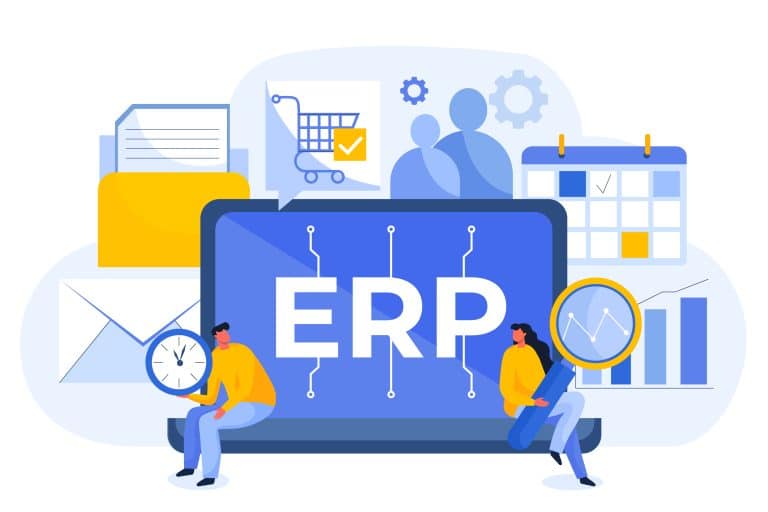Can ERP serve as an effective OMS?
With the rise of ecommerce and omnichannel retailing, many New Zealand retailers are questioning whether their existing Enterprise Resource Planning (ERP) systems can effectively serve as Order Management Solutions (OMS). While ERPs have traditionally been used to manage various business processes, including order management, the unique requirements of modern retail have led to a reevaluation of their suitability for this purpose.
Understanding ERPs
The origins and evolution of ERPs
Enterprise Resource Planning systems have their roots in the manufacturing industry, where they were initially developed to optimise production processes and manage resources effectively. Over time, ERPs evolved to encompass a wider range of business functions, including accounting, finance, human resources, and customer relationship management.
The primary purpose and functionality of ERPs
The primary purpose of an ERP system is to integrate and automate various business processes across an organisation, providing a centralised platform for managing data and resources. By consolidating information from different departments and functions, ERPs aim to improve efficiency, reduce costs, and enable better decision-making.
The centralised and integrated nature of ERPs
One of the key characteristics of ERPs is their centralised and integrated nature. By storing data in a single database and providing a unified interface for accessing and managing this information, ERPs eliminate data silos and ensure consistency across the organisation. This integration allows for seamless communication and collaboration between different departments and functions.
Limitations of using ERPs for retail order management

ERPs built for manufacturing, not sales and order fulfilment
While ERPs have proven to be valuable tools for manufacturing and other industries, they were not originally designed with the specific needs of retail sales and order fulfilment in mind. The dynamic nature of ecommerce and omnichannel retailing in New Zealand requires a level of flexibility and agility that traditional ERPs may struggle to provide.
Potential gaps in meeting retailers’ requirements
Retailers in New Zealand face unique challenges when it comes to order management, such as:
- Managing inventory across multiple channels
- Processing high volumes of orders in real time
- Providing personalised customer experiences
ERPs, with their focus on internal processes and batch-oriented processing, may not be well-equipped to handle these requirements effectively.
The back office nature of ERPs and lack of flexibility
ERPs are often considered back-office systems, designed to support internal operations rather than customer-facing processes. This orientation can limit their ability to adapt quickly to changing market conditions and customer preferences. Additionally, the complex and often rigid nature of ERPs can make it difficult to implement changes or integrate with other systems, hindering retailers’ ability to innovate and respond to new opportunities.
The critical role of OMS for retailers

Definition and functionality of an OMS
An Order Management System (OMS) is a specialised software solution designed to streamline and automate the entire order lifecycle, from initial customer purchase to final fulfilment and delivery. A robust OMS should be able to handle key functions such as:
| Function | Description |
| Order capture | Receiving and processing orders from various channels |
| Inventory management | Tracking and updating inventory levels in real time |
| Order routing | Assigning orders to the appropriate fulfilment locations |
| Payment processing | Handling various payment methods and transactions |
| Shipping and tracking | Coordinating the shipping process and providing tracking information |
OMS as the “brain” behind sales processes
In the context of modern retail, an OMS serves as the central hub or “brain” behind all sales processes. By integrating with various front-end and back-end systems, such as ecommerce platforms, point-of-sale systems, ERPs, and warehouse management systems, an OMS ensures that orders are processed efficiently and accurately, regardless of the channel through which they originated.
The impact of OMS on customer experience and retention
A well-implemented OMS can have a significant impact on customer experience and retention. By providing real-time visibility into inventory levels, enabling flexible fulfilment options (such as “click and collect” services popular in New Zealand), and offering personalised promotions and loyalty programmes, an OMS helps retailers deliver the seamless and convenient shopping experiences that today’s consumers demand. This, in turn, can lead to increased customer satisfaction, loyalty, and ultimately, higher sales and profitability. For more insights on how an OMS can enhance customer experience, read our article 12 Key Ways ERP Systems Boost Order Management Efficiency.
When to use an ERP as an OMS
Scenarios where an ERP might suffice for order management
For some retailers, particularly those with simpler business models or limited omnichannel presence, an ERP system may be sufficient for managing orders. An effective omnichannel retail strategy demands a transparent supply chain and delivery process with robust logistics and real-time order tracking across all channels to meet customers’ expectations for seamless omnichannel experiences.
This could include scenarios where a retailer primarily operates through a single channel (e.g., a local bricks-and-mortar store in Auckland), has a limited product catalogue, or deals with a relatively low volume of orders.
Benefits of using an ERP for OMS (cost, simplicity)
Using an ERP for order management can offer certain benefits, such as cost savings and simplicity. By leveraging an existing ERP system, retailers can avoid the expense and complexity of implementing a separate OMS solution. Additionally, having a single, integrated system for managing both back-office and front-office processes can simplify IT infrastructure and reduce the need for multiple vendor relationships.
Challenges of using an ERP as an OMS
Long-term costs and customisation issues
While using an ERP for order management may seem cost-effective initially, retailers often face significant long-term costs associated with customising and adapting the system to meet their specific needs. As business requirements evolve and new channels or fulfilment options are introduced, the cost and complexity of modifying an ERP can quickly escalate, leading to a higher total cost of ownership.
Complexity in managing a heavily customised system
When retailers attempt to use an ERP as an OMS, they often find themselves creating a heavily customised system – a patchwork of modifications, workarounds, and integrations that can be difficult to manage and maintain. This complexity can lead to:
- Data inconsistencies
- Performance issues
- Increased risk of system failures
Difficulty in meeting evolving customer expectations
As customer expectations continue to rise, retailers must be able to adapt quickly to new trends and preferences. However, the rigid nature of ERPs can make it challenging to implement changes or introduce new features and functionalities in a timely manner. This lack of flexibility can hinder a retailer’s ability to stay competitive and meet the ever-changing demands of the market.
Risks to financial data integrity
Using an ERP as an OMS often requires significant customisation, which can potentially compromise the integrity of financial data. As the ERP is typically the system of record for financial information, any issues or errors introduced through customisation can have serious consequences for a retailer’s financial reporting and compliance.
Challenges in adding new capabilities and technologies
Retailers often need to integrate new capabilities and technologies to enhance their order management processes, such as:
- Payment gateways
- Loyalty programmes
- Fraud detection systems
The complementary relationship between OMS and ERP
How a dedicated OMS complements ERP functionality
While ERPs play a crucial role in managing back-office processes, a dedicated OMS is designed to handle the unique challenges of modern retail order management. By integrating with an ERP and other systems, an OMS can provide a single, unified view of customer orders and inventory across all channels, enabling retailers to make informed decisions and optimise their operations.
The advantages of a specialised OMS for retailers
A specialised OMS offers several key advantages for retailers, including:
- Real-time inventory visibility and order processing
- Flexible order routing and fulfilment options
- Seamless integration with ecommerce platforms and other systems
- Robust reporting and analytics capabilities
- Scalability to handle high order volumes and peak periods
By leveraging a dedicated OMS alongside their ERP, retailers can benefit from the best of both worlds – the stability and reliability of an ERP for back-office functions, and the agility and specialisation of an OMS for managing the complex demands of modern retail.
Options for order management
Storefront software suite modules
Some ecommerce platforms and storefront software suites offer built-in order management modules. These can be a good option for retailers with relatively simple order management needs who want to maintain a unified software environment.
In-house OMS development
Larger retailers with extensive IT resources may choose to develop their own custom OMS solution in-house. While this approach offers the highest level of control and customisation, it also comes with significant costs, risks, and ongoing maintenance responsibilities.
For a deeper understanding of the differences between various order management solutions, check out our comprehensive guide Choosing Between WMS and OMS: A Comprehensive Guide for Businesses and our article OMS vs. DOM: Understanding the Key Differences and Benefits.
Dedicated OMS solutions
For most retailers, partnering with a dedicated OMS provider offers the best balance of functionality, flexibility, and cost-effectiveness. These purpose-built solutions are designed to handle the complexities of modern retail order management and can easily integrate with existing ERPs and other systems.
JCurve Solutions offers a compelling alternative with NetSuite Order Management features. As a dedicated OMS provider, we emphasise the automation of the entire order life cycle, from the initial order through delivery and post-delivery, which aligns well with the needs of modern retail order management. Our ERP solutions aim to tackle common challenges head-on, including stock management, shipping costs, and efficient returns management.
| Option | Pros | Cons |
| Storefront software suite modules | – Unified software environment- Suitable for simple order management needs | – Limited customisation options- May not scale well for complex operations |
| In-house OMS development | – High level of control and customisation | – Significant costs and risks- Ongoing maintenance responsibilities |
| Dedicated OMS solutions | – Purpose built for modern retail order management- Easy integration with existing systems- Balance of functionality, flexibility, and cost effectiveness | – Requires careful selection and evaluation of providers |
In a Nutshell
Ultimately, the key to effective retail order management lies in leveraging the strengths of both ERPs and dedicated OMS solutions. By using an ERP for core back-office functions and a specialised OMS for handling the intricacies of omnichannel order management, New Zealand retailers can create a powerful, flexible, and scalable technology stack that will support their business now and in the future.
As the retail industry continues to transform, those who invest in the right order management solutions will be best positioned to adapt, innovate, and thrive in the face of new challenges and opportunities. By carefully evaluating their needs and considering the various options available, retailers can select an OMS that will help them streamline operations, improve customer experiences, and drive long-term growth. If you’re looking to enhance your order management system with a solution that adapts and grows with your business, consider exploring what JCurve has to offer.
(Targeting ecommerce businesses and omnichannel retail)
https://blog.deckcommerce.com/erp-as-an-order-management-system-oms (main one)
https://blog.intershop.com/en/erp-and-oms-agile-ecommerce
https://www.hotwax.co/blog/erp-vs-oms-finding-the-right-balance-in-omnichannel-retailing










